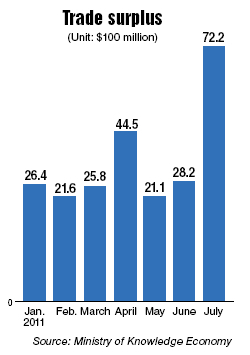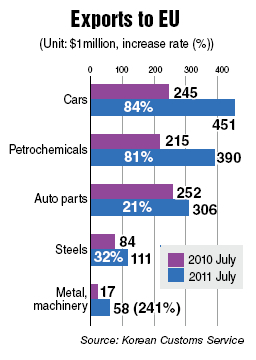
‘FTA effect’ may be felt in the second half of the year, customs agency says
South Korea’s trade surplus widened sharply in July from the previous month as exports grew at a faster pace than imports, the government said Monday.
The country’s trade surplus reached $7.2 billion last month, compared with a surplus of $3.3 billion in June, according to the Ministry of Knowledge Economy. The figure for July also marks a 44.4 percent spike from $5 billion in July 2010.
Exports surged 27.3 percent on-year to a new monthly high of $51.4 billion last month with imports rising 24.8 percent to $44.2 billion.
“With the strong economic recoveries of emerging markets, shipments of products such as steel and petrochemical and petroleum goods led the export growth,” the ministry said.
Shipments of petroleum products spiked 89.2 percent on-year in July with exports of steel products rising 72.5 percent.
Exports to developing countries, such as the 10 member nations of the Association of Southeast Asian Nations, rose 34.5 percent from the same period last year while exports to developed countries, including the United States, only inched up 4.0 percent, according to the ministry.

Korea posts deficit with EU following FTA
South Korea posted a trade deficit with the European Union in July, the first month of a free trade compact between the two regions, customs data found Monday.
It was the nation’s first trade shortfall with EU since 2000 when related data started to be collected.
Exports to EU decreased to $4.08 billion in July, down 12 percent from the same period last year, while imports increased to $4.14 million, according to the Korea Customs Service.
Total trade deficit amounted to $80 million last month, compared with a surplus of $1 billion a year earlier.
Automobiles and oil products that had been expected to benefit from the Korea-EU pact saw a more than 80 percent growth in exports. Exports of smaller businesses such as wigs and artificial eyelashes and umbrellas were also more than doubled last month.
But exports of other items such as vessels, wireless communication equipment and semiconductors sharply decreased.
“Overall exports to EU decreased amid the widening financial crisis among EU members states and due to base effects from July when the exports of ships enjoyed a brisk growth,” said a customs agency official.
“When excluding the shipbuilding sector, the exports to EU rather increased 15 percent.”
According to the customs agency, exports of the products benefiting directly from the pact reached $3.2 billion last month, a 28 percent increase from a year earlier.
“Considering the early effects, the free trade pact is expected to revitalize the local economic conditions and boost the shared growth between large and smaller businesses in the second half of the year,” the official said.
Meanwhile, imports from EU were led by aircraft and its parts and automobiles that increased 1,693 percent and 96 percent, respectively.
Amid the soaring food prices here, the imports of food items also became apparent. Imports of pork increased most 215 percent, followed by poultry with 37 percent, cheese with 44 percent, wine with 30 percent and chocolate with 19 percent.
In the first month of the FTA, 58.7 percent of local companies were found to use the free trade pact. The figure was far higher than the annual rate of 3.5 percent for the Korea-ASEAN pact. The rate for imports stood at 22 percent.
By Lee Ji-yoon and news reports (
jylee@heraldcorp.com)









